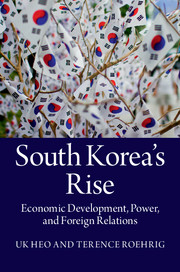Book contents
- Frontmatter
- Dedication
- Contents
- List of figures
- List of tables
- Acknowledgements
- 1 Introduction
- 2 Economic development, state power, and foreign policy
- 3 Inter-Korean relations: confrontation, economic exchanges, and the nuclear crisis
- 4 South Korea and the United States: from dependency to partnership
- 5 South Korea, Russia, and China: from adversaries to economic partners
- 6 South Korea and Japan: an ambivalent relationship
- 7 South Korea and the European Union: evolving cooperation and competition
- 8 South Korea and India: opportunities and obstacles
- 9 South Korea and the developing world: Africa, Latin America, the Middle East, and Southeast Asia
- 10 Contributing to the international community: from consumer to producer
- 11 Conclusion
- Bibliography
- Index
- References
6 - South Korea and Japan: an ambivalent relationship
Published online by Cambridge University Press: 05 July 2014
- Frontmatter
- Dedication
- Contents
- List of figures
- List of tables
- Acknowledgements
- 1 Introduction
- 2 Economic development, state power, and foreign policy
- 3 Inter-Korean relations: confrontation, economic exchanges, and the nuclear crisis
- 4 South Korea and the United States: from dependency to partnership
- 5 South Korea, Russia, and China: from adversaries to economic partners
- 6 South Korea and Japan: an ambivalent relationship
- 7 South Korea and the European Union: evolving cooperation and competition
- 8 South Korea and India: opportunities and obstacles
- 9 South Korea and the developing world: Africa, Latin America, the Middle East, and Southeast Asia
- 10 Contributing to the international community: from consumer to producer
- 11 Conclusion
- Bibliography
- Index
- References
Summary
When asking Japanese teens about their favorite music, answers will often include the K-pop music phenomenon of all-girl or all-boy bands from South Korea. In addition, some of the most watched television shows in Japan are Korean dramas such as Winter Sonata and Love Rain. Yet despite this element of cultural affinity, deep feelings of distrust and animosity permeate the ties of these two countries separated by a body of water whose name, East Sea or Sea of Japan, evokes sharp disagreement. According to a joint survey conducted in April 2013 by a South Korean and a Japanese newspaper, 78 percent of South Koreans believed relations were bad between the two countries, an increase of 14 points since the survey was last taken in 2011. Japanese feelings for South Korea had deteriorated even further; 71 percent thought relations were bad up from 27 percent in 2011.
South Korea and Japan have a long relationship that goes back centuries but it has often been a difficult one. On several occasions, Japan invaded Korea either to conquer the peninsula or as a thoroughfare to reach China. From 1910 to 1945, Japan occupied Korea, a brutal period in Korea’s history that continues to form the backdrop for a relationship that is often strained. South Korea and Japan normalized relations in 1965 during the early years of the ROK economic takeoff, and economic ties have grown significantly. Furthermore, both are democracies and share important security interests, in part as treaty allies with the United States. Yet despite these commonalities, the relationship has remained delicate due largely to the legacies of history, and the ongoing dispute over the islands Koreans refer to as Dokdo and the Japanese call Takeshima. Relations hit a particular low point in fall 2012 and have shown few signs of improvement.
- Type
- Chapter
- Information
- South Korea's RiseEconomic Development, Power, and Foreign Relations, pp. 88 - 109Publisher: Cambridge University PressPrint publication year: 2014



